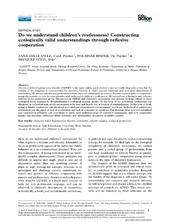| dc.contributor.author | Helle-Valle, Anna | |
| dc.contributor.author | Binder, Per-Einar | |
| dc.contributor.author | Stige, Brynjulf | |
| dc.date.accessioned | 2016-12-28T09:48:46Z | |
| dc.date.available | 2016-12-28T09:48:46Z | |
| dc.date.issued | 2015-12-21 | |
| dc.Published | International Journal of Qualitative Studies on Health and Well-being 2015, 10:29292 | eng |
| dc.identifier.issn | 1748-2631 | |
| dc.identifier.uri | https://hdl.handle.net/1956/15269 | |
| dc.description.abstract | Attention-deficit/hyperactivity disorder (ADHD) is the most widely used children’s mental health diagnosis today, but the validity of the diagnosis is controversial, for instance, because it might conceal relational and ecological dimensions of restlessness. We invited parents and professionals from one local community in western Norway to participate in cooperative group discussions on how to conceptualize and understand children’s restlessness. We carried out a thematic and reflexive analysis of the cooperative group discussions on ADHD and children’s restlessness, and present findings related to three ecological levels inspired by Bronfenbrenner’s ecological systems model. At the level of the individual, restlessness was discussed as individual trait, as the expectation to be seen and heard, and as a result of traumatization. At the level of dyad, group or family, restlessness was discussed as a relational phenomenon and as parents’ problems. At the level of community, restlessness was discussed as lack of cooperation and lack of structures or resources. Our findings show how contextualized and cooperative reflexivity can contribute to more valid understandings of children’s restlessness, and how cooperative inquiry can stimulate reflections about solidarity and sustainability in relation to adult’s actions. | en_US |
| dc.language.iso | eng | eng |
| dc.publisher | Co-Action Publishing | eng |
| dc.rights | Attribution CC BY | eng |
| dc.rights.uri | http://creativecommons.org/licenses/by/4.0 | eng |
| dc.subject | Attention-deficit hyperactivity disorder | eng |
| dc.subject | cooperative reflexive inquiry | eng |
| dc.subject | ecological perspectives | eng |
| dc.title | Do we understand children’s restlessness? Constructing ecologically valid understandings through reflexive cooperation | eng |
| dc.type | Peer reviewed | |
| dc.type | Journal article | |
| dc.date.updated | 2016-11-04T08:46:08Z | |
| dc.description.version | publishedVersion | |
| dc.rights.holder | Copyright 2015 The Author(s) | eng |
| dc.identifier.doi | https://doi.org/10.3402/qhw.v10.29292 | |
| dc.identifier.cristin | 1308948 | |

